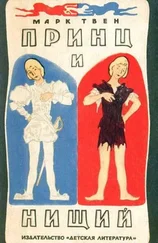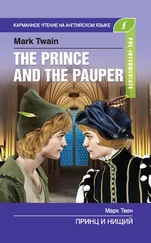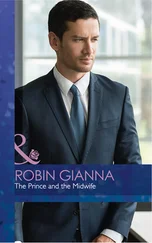'Long live the king!'
Poor Tom's dazed eyes wandered abroad over this stupefying spectacle, and finally rested dreamily upon the kneeling princesses beside him a moment, then upon the Earl of Hertford. A sudden purpose dawned in his face. He said, in a low tone, at Lord Hertford's ear:
'Answer me truly, on thy faith and honor! Uttered I here a command, the which none but a king might hold privilege and prerogative to utter, would such commandment be obeyed, and none rise up to say me nay?'
'None, my liege, in all these realms. In thy person bides the majesty of England. Thou art the king — thy word is law.'
Tom responded, in a strong, earnest voice, and with great animation:
'Then shall the king's law be law of mercy, from this day, and never more be law of blood! Up from thy knees and away! To the Tower and say the king decrees the Duke of Norfolk shall not die!'
The words were caught up and carried eagerly from lip to lip far and wide over the hall, and as Hertford hurried from the presence, another prodigious shout burst forth:
'The reign of blood is ended! Long live Edward king of England!'
CHAPTER XII (Глава двенадцатая)
The Prince and his Deliverer (Принц и его избавитель)
AS soon as Miles Hendon and the little prince were clear of the mob (как только Майлс Хендон и маленький принц были чисты от толпы = выбрались из толпы), they struck down through (двинулись через; to strike — бить) back lanes and alleys toward the river (задние улочки и переулки к реке). Their way was unobstructed (их путь был (ничем) не прегражден) until they approached (пока они не достигли) London Bridge (Лондонского моста); then they plowed (тогда они влились) into the multitude again (в толпу опять), Hendon keeping a fast grip upon the prince's — no, the king's — wrist (Хендон, держа крепкую хватку на запястье принца, нет, короля). The tremendous news (ужасная новость) was already abroad (была уже повсюду), and the boy learned it (и мальчик узнал ее) from a thousand voices at once (от тысячи голосов сразу) — 'The king is dead (король умер)!' The tidings struck a chill to the heart of the poor little waif (известия ударили холодом в сердце бедного маленького беспризорника; to strike — бить), and sent a shudder through his frame (и послали дрожь по его телу; to send — посылать). He realized the greatness of his loss (он осознавал величие своей потери), and was filled with a bitter grief (и был наполнен горькой скорбью); for the grim tyrant (ибо мрачный тиран) who had been such a terror to others (который бывал таким ужасом для других) had always been gentle with him (всегда был добр с ним). The tears sprung to his eyes and blurred all objects (слезы выступили у него на глазах и затуманили все предметы). For an instant he felt himself the most forlorn (на минуту он почувствовал себя самым одиноким), outcast (изгнанным), and forsaken of God's creatures (и брошенным среди Божьих тварей) — then another cry shook the night (затем другой крик сотряс ночь) with its far-reaching thunders (своим далеко достающим громом): 'Long live King Edward the Sixth (да здравствует король Эдуард Шестой)!' and this made his eyes kindle (и это заставило его глаза зажечься; to make — делать, заставлять), and thrilled him with pride to his fingers' ends (и вызвало трепет от гордости до кончиков пальцев). 'Ah (ах),' he thought (подумал он; to think — думать), 'how grand and strange it seems (как великолепно и странно это кажется) — I AM KING (я король)!'
Our friends threaded their way slowly (наши друзья прокладывали свой путь медленно) through the throngs upon the Bridge (сквозь толпы на мосту). This structure (эта постройка), which had stood for six hundred years (которая стояла шестьсот лет), and had been a noisy and populous thoroughfare (и была шумной и людной проезжей дорогой) all that time (все это время), was a curious affair (была любопытным делом), for a closely packed rank of stores and shops (ибо плотно набитый ряд лавок и магазинов), with family quarters overhead (с квартирами семей на втором этаже: «над головой»), stretched along (протянулся вдоль) both sides of it (обеих его сторон), from one bank of the river to the other (от одного берега реки до другого). The Bridge was a sort of town to itself (мост был чем-то вроде города сам по себе); it had its inn (он имел свой постоялый двор), its beerhouses (свои пивные), its bakeries (свои пекарни), its haberdasheries (свои мелочные лавки), its food markets (свои продуктовые рынки), its manufacturing industries (свои мануфактурные производства), and even its church (и даже свою церковь). It looked upon the two neighbors which it linked together (он смотрел на двух соседей, которые он соединял вместе) — London and Southwark (Лондон и Саутуорк) — as being well enough (как (на) бывшие вполне неплохими), as suburbs (как пригороды), but not otherwise particularly important (иначе же не особенно важные). It was a close corporation, so to speak (это была закрытая корпорация, так сказать); it was a narrow town (это был узкий город), of a single street a fifth of a mile long (из одной улицы длиной в пятую часть мили), its population was but a village population (его население было размером с деревню: «лишь деревенским населением»), and everybody in it knew all his fellow-townsmen intimately (и каждый в нем знал всех своих сограждан близко; to know — знать), and had known their fathers and mothers before them (и знал их отцов и матерей до них) — and all their little family affairs into the bargain (и все их маленькие семейные дела в придачу; bargain — сделка). It had its aristocracy (у него была своя аристократия), of course (конечно) — its fine old families of butchers (его прекрасные старые семьи мясников), and bakers (и пекарей), and what not (и так далее), who had occupied the same old premises (которые занимали те же самые старые помещения) for five or six hundred years (пятьсот или шестьсот лет), and knew the great history of the Bridge from beginning to end (и знали великую историю Моста от начала до конца), and all its strange legends (и все его странные легенды); and who always talked bridgy talk (и которые говорили на «мостовом» наречии), and thought bridgy thoughts (и думали «мостовые» мысли), and lied in a long, level, direct, substantial bridgy way (и врали длинным, одинаковым, уравновешенным, основательным «мостовым» образом). It was just the sort of population to be narrow and ignorant and self-conceited (это было как раз такое население, чтобы быть узколобым: «узким», и невежественным, и спесивым). Children were born on the Bridge (дети рождались на Мосту), were reared there (были воспитаны там), grew to old age and finally died (дорастали = доживали до старого возраста и наконец уирали) without ever having set a foot (так никогда и не опустив ногу) upon any part of the world but London Bridge alone (на какую-либо часть света, кроме одного Лондонского моста). Such people would naturally imagine (такие люди естественно воображали бы) that the mighty and interminable procession which moved through its street night and day (что могучая и нескончаемая процессия, которая двигалась через его улицу ночь и день), with its confused roar of shouts and cries (со своим беспорядочным гулом криков и возгласов), its neighings and bellowings and bleatings (своим ржанием коней, мычанием коров, блеянием овец) and its muffled thunder-tramp (и своим приглушенным громовым топотом), was the one great thing in this world (была единственной великой вещью в мире), and themselves somehow the proprietors of it (а сами они — каким-то образом владельцы ее). And so they were in effect (и так они были = и так они и делали в сущности) — at least they could exhibit it from their windows (по крайней мере, они могли выставить это из окон), and did (и делали /так/) — for a consideration (за вознаграждение) — whenever a returning king or hero gave it a fleeting splendor (каждый раз когда возвращающийся король или герой придавал ему мимолетное великолепие), for there was no place like it (потому что не было места как это = другого такого места) for affording (для позволения = где был бы возможно) a long, straight, uninterrupted view of marching columns (длинное, прямое, непрерывное зрелище марширующих колонн).
Читать дальше
Конец ознакомительного отрывка
Купить книгу
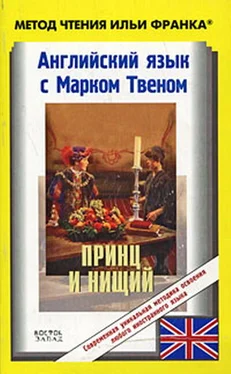

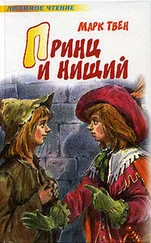

![Марк Твен - Принц и нищий [Издание 1941 г.]](/books/148799/mark-tven-princ-i-nichij-izdanie-1941-g-thumb.webp)
